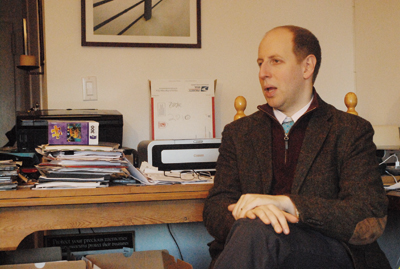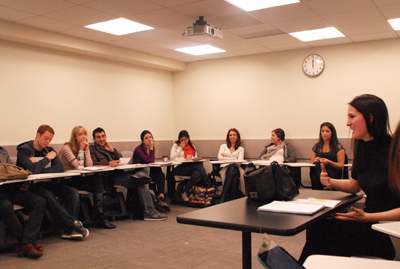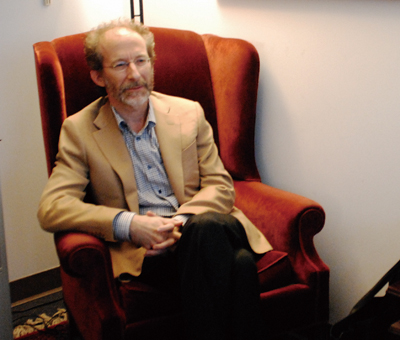Ewha Voice reports in New York, How to pursue happiness wisely


To explore more about positive psychology and how it can contribute to the level of happiness among university students, Ewha Voice visited New York University and interviewed professor Alan Schlechter who lectures “Science of Happiness.” Ewha Voice also Interviewed Professor Richard Summers from the Positive Psychology Center at the University of Pennsylvania, which was established by Martin Seligman, the founder of positive psychology.
What is positive psychology?
Professor Richard Summers, a staff member at the Positive Psychology Center and a clinical associate professor of psychiatry at the University of Pennsylvania, said when positive psychology emerged as a new field in 1998 by Martin Seligman, the founder of the Positive Psychology Center at the University of Pennsylvania, a “profound question” was raised.
“From my perspective, the basic endeavor of traditional psychiatry and clinical psychology has been to diagnose, categorize, and treat patients’ problems to diminishing problems so that patients could reach a relatively problem-free state,” professor Summers said. “However, positive psychology asks a profound question - whether a good life means simply a life without problems or a life without depression.”
In that, positive psychology therapies or treatments tend to focus more on developing patients’ psychological strengths rather than only diminishing the negative symptoms of patients.
“Helping people shape fulfilling relationships and find one’s strengths and apply are one of the most important factors that positive psychology focuses on .”
How students bring happiness to their lives: Professor Schlechter’s “Science of Happiness” course
Not every university student gets the chance to hear a story of how their professor overcame his/her life-long fear, such as a dog phobia, but such is not the case for students at New York University.
“I used to run away even from a Chihuahua since I grew up being afraid of dogs after seeing my sister being bitten by a Dachshund,” said professor Alan Schlechter, the instructor of the course “Science of Happiness” at New York University in USA.
With a piercing voice and big smile on his face, professor Schlechter continued to tell of his personal experience of how he met 10 healing dogs and overcame his phobia. Using his personal example, the professor makes sure students understand the concept of quantum change - a sudden, dramatic, and enduring transformation that affects a broad range of personal emotions, cognition, and behaviors.
Why college students should “study” happiness
The course “Science of Happiness” was opened by professor Schlechter and two other professors as a seminar course for 25 students. Now, he is the only instructor and he plans to expand the class for about 200 students.
“The odds of having a mental illness are the highest in college,” professor Schlechter said. “College is supposed to stress you out. Students leave their homes, families, community support, high school athletic teams, or so many familiar things. But a lot of students do not have a coping mechanism.”
Since recognizing and dealing with the transition from childhood to adulthood is not easy, professor Schlechter designed this course to enable students to learn how individuals can create positive changes and become happier by helping students find their strengths and take care of their physical health.
In particular, professor Schlechter recommended studying the science of happiness as important for seniors.
“I think my class is very useful for seniors in college, who are often very worried about leaving college and not knowing what they are going to do next. My class encourages them to rely on themselves more and to trust in their abilities a bit more.”
Science of happiness, a combination of physical and mental health and doing meaningful activities
According to professor Schlechter, the definition of happiness can be broken up into several pieces.
“You need pleasure, engagement or flow, activities in which time passes quickly and you are totally involved in the process, meaningful activities that use your virtues and strengths, doing good deeds, having good relationships, achieving your goals and so on.”
Throughout the course, students learn facts that are applicable to real life for promoting their happiness such as positive thinking, stress reduction and management, eating and nutrition, sleeping, exercising, and setting meaningful goals. Also, they learn they should actively pursue happiness rather than just “wait for it.”
“You really learn how interrelated everything is for your happiness,” Timothy Smith (New York University, 4) said. “You have to eat properly, exercise and do what you can do to stay healthy. Also, you need to proactively pursue it.”

The most “personal” class you could imagine
The course really encourages students to be more mindful of their health and thinking.
“The subjects of the course are not monkey or rabbit experiments for psychology, but students themselves,” professor Schlechter said. “So students who do not like thinking about themselves might feel some difficulty during this course.”
In that, the professor provides special weekly assignments that seem to be casual and personal for an ordinary university student.
“We had a student activity on the first week of this class, which was checking things that made us happy during the day,” Lindsay Howard (New York University, 3) said.
During the remaining four classes of the course, professor Schlechter devised a “Final Project.” For the project, students need to think about a creative activity that can disseminate information about positive psychology and student wellness on campus. Last semester, some students did a bubble show at the park in front of a school and took videos of people’s faces filled with joy. Some students introduced a place where they could become happy, and so on.
Another key feature of this course is mandatory attendance at a weekly recitation, which accounts for the largest proportion of students’ grades. Currently, there are four teaching assistants overseeing a total of eight recitation groups, with around 25 students each.
“A recitation gives people an opportunity to actually process what they read and heard,” said Mary Smith, one of the four teaching assistants for this class.
Different from recitations for other courses, the recitation for this course is much more group-oriented and focuses on sharing personal experiences about the students’ sleeping habits, exercising their schedule, or whatever topic they learned in the professor’s previous lecture.
Since the recitation requires much commitment and teamwork, a sense of community is strengthened as the course progresses.
“I remember another student who said nothing on the first week,” Smith said. “But as the weeks went on, she even baked muffins for the entire class and sort of gave everyone an opportunity to connect with her differently. Now she freely communicates in her group.”
Avi Ramprashad (New York University, 4) recalled that sharing ideas on each student’s sleeping habit was the most helpful.
“You know, everyone has something to say about sleep habits and it was lots of fun,” Ramprashad said. “We discussed each one’s best way to fall asleep and many ways came up like eating before sleep, watching a movie, and so on.”
“The tool basket with the tools you can draw upon for future emergency uses.”
For Joseph Anzora (New York University, 1), taking this course was highly satisfactory since it taught him practical tactics to bring happiness into his daily life.
“I am a nursing major and I even have a part time job,” Anzora said. “After taking this course, I try my best to adjust my schedule so I can remain in a happier state. I negotiated with my boss so that I work 11.5 hours a week instead of 20 hours to maintain my physical and mental health.”
Some student described this course as “the tool basket with the tools you can draw upon for future emergency uses.”
“I am an acting major and I might not be able to get a job immediately after graduating from college or face many difficulties as my life goes on,” Timothy Smith said. “But I could at least try to happy, trying to do my meaningful activities so that I can stay in a happy, energetic state so that I could finally get a job soon.”

